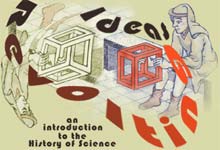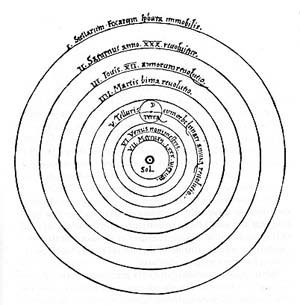
University of California, Irvine
Instructor: Dr. Barbara J. Becker

|
Week 3. Humanism Foreword and Preface to the Reader
|
TO THE READER CONCERNING THE HYPOTHESES OF THIS WORK
Since the newness of the hypotheses of this work--which sets the earth in motion and puts an immovable sun at the center of the universe--has already received a great deal of publicity, I have no doubt that certain of the savants have taken grave offense and think it wrong to raise any disturbance among liberal disciplines which have had the right set-up for a long time now. If, however, they are willing to weigh the matter scrupulously, they will find that the author of this work has done nothing which merits blame. For it is the job of the astronomer to use painstaking and skilled observation in gathering together the history of the celestial movements, and then--since he cannot by any line of reasoning reach the true causes of these movements--to think up or construct whatever causes or hypotheses he pleases such that, by the assumption of these causes, those same movements can be calculated from the principles of geometry for the past and for the future too.
[I]t is not necessary that these hypotheses should be true, or even probable; but it is enough if they provide a calculus which fits the observations.... For it is sufficiently clear that this art is absolutely and profoundly ignorant of the causes of the apparent irregular movements. And if it constructs and thinks up causes--and it has certainly thought up a good many--nevertheless it does not think them up in order to persuade anyone of their truth but only in order that they may provide a correct basis for calculation....
Therefore let us permit these new hypotheses to make a public appearance among old ones which are themselves no more probable, especially since they are wonderful and easy and bring with them a vast storehouse of learned observations. As far as hypotheses go, let no one expect anything in the way of certainty from astronomy, since astronomy can offer us nothing certain, lest, if anyone take as true that which has been constructed for another use, he go away from this discipline a bigger fool than when he came to it.
Farewell.
I can reckon easily enough, Most Holy Father, that as soon as certain people learn that in these books of mine which I have written about the revolutions of the spheres of the world I attribute certain motions to the terrestrial globe, they will immediately shout to have me and my opinion hooted off the stage.... And although I realize that the conceptions of a philosopher are placed beyond the judgment of the crowd, because it is his loving duty to seek the truth in all things, in so far as God has granted that to human reason; nevertheless I think we should avoid opinions utterly foreign to rightness.
I considered how absurd this "lecture" would be held by those [of] the opinion that the Earth rests immovable in the middle of the heavens ... if I were to assert to the contrary that the Earth moves; for a long time I was in great difficulty as to whether I should bring to light my commentaries written to demonstrate the Earth's movement, or whether it would not be better to follow the example of the Pythagoreans ... who used to hand down the mysteries of their philosophy not in writing but by word of mouth and only to their relatives and friends.... When I weighed these things in my mind, the scorn which I had to fear on account of the newness and absurdity of my opinion almost drove me to abandon a work already undertaken.
But my friends made me change my course in spite of my long-continued hesitation and even resistance.... They said that the absurder my teaching about the movement of the Earth now seems to very many persons, the more wonder and thanksgiving will it be the object of, when after the publications of my commentaries those same persons see the fog of absurdity dissipated by my luminous demonstrations....
But perhaps Your Holiness will not be so much surprised at my giving the results of my nocturnal study to the light ... as you will be eager to hear from me what came into my mind that in opposition to the general opinion of mathematicians and almost in opposition to common sense I should dare to imagine some movement of the Earth.... Nothing except my knowledge that mathematicians have not agreed with one another in their researches moved me to think out a different scheme of drawing up the movements of the spheres of the world.
For in the first place mathematicians are so uncertain about the movements of the sun and moon that they can neither demonstrate nor observe the unchanging magnitude of the revolving year. Then in setting up the solar and lunar movements and those of the other five wandering stars, they do not employ the same principles, assumptions, or demonstrations for the revolutions and apparent movements. For some make use of homocentric circles only, others of eccentric circles and epicycles ... nevertheless they have not been able to establish anything for certain that would fully correspond to the phenomena....
Moreover, they have not been able to discover or to infer the chief point of all, i.e., the form of the world and the certain commensurability of its parts. But they are in exactly the same fix as someone taking from different places hands, feet, head, and the other limbs--shaped very beautifully but not with reference to one body and without correspondence to one another--so that such parts made up a monster rather than a man. And so, in the process of demonstration which they call "method," they are found either to have omitted something necessary or to have admitted something foreign which by no means pertains to the matter; and they would by no means have been in this fix, if they had followed sure principles....
Accordingly, when I had meditated upon this lack of certitude in the traditional mathematics concerning the composition of movements of the spheres of the world, I began to be annoyed that the philosophers, who in other respects had made a very careful scrutiny of the least details of the world, had discovered no sure scheme for the movements of the machinery of the world, which has been built for us by the Best and Most Orderly Workman of all....
 |
And so, having laid down the movements which I attribute to the Earth farther on in the work, I finally discovered by the help of long and numerous observations that if the movements of the other wandering stars are correlated with the circular movement of the Earth, and if the movements are computed in accordance with the revolution of each planet, not only do all their phenomena follow from that but also this correlation binds together so closely the order and magnitudes of all the planets and of their spheres or orbital circles and the heavens themselves that nothing can be shifted around in any part of them without disruption the remaining parts and the universe as a whole....
If perchance there are certain "idle talkers" who take it upon themselves to pronounce judgment, although wholly ignorant of mathematics, and if by shamelessly distorting the sense of some passage in Holy Writ to suit their purpose, they dare to reprehend and to attack my work; they worry me so little that I shall even scorn their judgments as foolhardy.... The studious need not be surprised if people like that laugh at us. Mathematics is written for mathematicians....
|